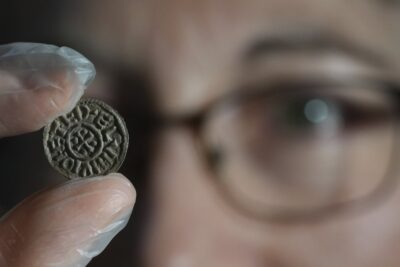With metal detectors and patience, amateur treasure hunters unearth pieces of British history
By Canadian Press on February 11, 2025.

LONDON (AP) — When Malcolm Weale saw the tiny, dirt-covered object he’d unearthed in an English field, he knew it was something special.
In his hand was a silver penny minted during the reign of Guthrum, a Viking commander who converted to Christianity and ruled eastern England in the ninth century as Athelstan II.
For Weale, finding the first silver coin minted by a Viking ruler in Britain was the pinnacle of decades of hunting with his metal detector in the fields and forests near his home in eastern England.
“I was shaking,” Weale said at the British Museum, where the coin was displayed Tuesday alongside other items unearthed by amateur history hunters in 2023 and 2024. “I knew that it was a life-changing, incredible, historical find.
“I’d watched the series ‘Vikings’ on Netflix, and about a week later I’ve got the Guthrum penny in my hand,” he said.
The thrill of finding fragments of history beneath our feet drives detectorists like 54-year-old Weale, who was introduced to the pastime at the age of 7 and “was hooked.”
His find was on show as the museum released its annual report on the Portable Antiquities Scheme, a government-funded project that records thousands of archaeological discoveries made by the public each year. The coin sat alongside a set of 3,000-year-old bronze metalworkers’ tools, a seventh-century gold and garnet necklace, and a gold signet ring with an intriguing link to Queen Elizabeth I.
They have been officially classed as “treasure” by a coroner, meaning they will be independently valued and offered to local museums.
Discoveries by detectorists, as well as beachcombers and mudlarkers — who search for items on riverbanks — shine new light into corners of British history. The necklace of glittering gold and garnet pendants found in Lincolnshire, central England, reveals the sophistication of Anglo-Saxon craftsmanship, and is surprisingly global.
Archaeologist Helen Geake, who serves as a “finds liaison officer” for the antiquities program, said that it was likely made in England – “English craftsmen were by far the best in Europe” – with garnets from Sri Lanka.
Andy Akroyd, 49, also struck gold when he was out metal detecting near his home in Bedfordshire, central England.
“When I first saw it, I thought ‘Oh it’s a coin.’ Then I saw it’s a ring, I was thinking 1980s, cheap sovereign ring,” Akroyd said.
It turned out to be a 16th-century signet ring engraved with a phoenix, a mythical bird symbolizing rebirth that was associated with Elizabeth I. Found in an area used as a royal hunting ground in Elizabethan times, it was likely worn, and lost, by one of the queen’s supporters.
“When you find it, your journey is just beginning,” Akroyd said. Then come the questions: “What is this, how is it here?”
When items are declared treasure, their value is split between the finder and the owner of the land where it was found. Detectorists occasionally strike it rich – last year, a hoard of 1,000-year-old coins found in southwest England sold for 4.3 million pounds ($5.3 million).
But the vast majority are in it for the thrill of discovery, not the money, Weale said.
“You could be a multi-multi-millionaire, but you could never buy that feeling that you feel when you find something,” he said.
Both he and Akroyd say that they will soon be back out tramping the fields, in the mud and — this is England, after all — the rain.
“You always find the best stuff when the weather’s terrible,” Weale said.
Both men extol the mental health benefits of the methodical, slow-paced hobby, popularized to a wider audience by the gentle BBC sitcom “ Detectorists.”
“All I’m thinking about when I’m out metal detectoring is history,” Weale said. “Kings, queens — I’m totally in the zone. I’m not worried about bills, or even keeping warm. Sometimes I forget to eat.”
Akroyd said that some days he just sits, watching hares leap and birds of prey soar in the sky.
“I lost my dad last year. I’ll have a chat to my dad when I’m out in the field. ‘Come on, Dad — what way now?’” Akroyd said. “He never finds me anything.”
Jill Lawless, The Associated Press
-26


